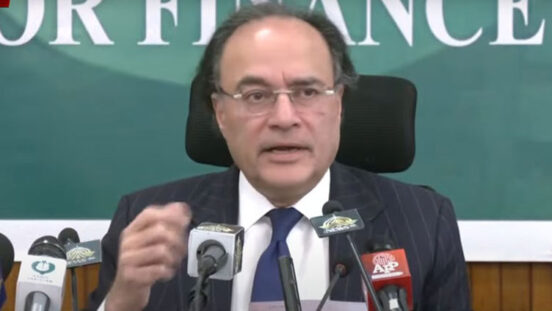ISLAMABAD-UNS: A day after presenting the budget for fiscal year 2025-26 in the National Assembly, Federal Minister for Finance and Revenue Muhammad Aurangzeb on Wednesday held a post-budget presser despite the boycott of journalists.
Journalists on Wednesday boycotted the post-budget press conference and walked out of the presser in protest against the attitude of the government and the FBR officials.
Protesting journalists said the minister tried to conceal facts about new taxes. Finance secreatry tried to defuse the situation. However, the finance minister started briefing the remaining newsmen sitting in the hall.
Later, the journalists rejoined the presser.
Speaking about tariff reforms, the minister said that the tariff reform mentioned during the budget speech was very significant, adding that out of a total of 7,000 tariff lines, the government has decided to eliminate additional customs duty on 4,000 of them.
Commenting on the relief provided to the weighed down salaried class, he said that the government wanted to provide maximum relief to the salaried class, but added, “the reality is that we can only offer as much relief as our fiscal space permits.”
He stated that this year, over Rs400 billion in taxes were collected through enforcement. “There are only two ways: either enforce (tax collection) or impose new taxes. In this regard, we will engage both houses (of Parliament) for legislation.”
He further said that the Board was consulted on the decision not to impose additional taxes on the agriculture sector, and that small farmers will be provided loans on easy terms.
Shedding light on efforts to increase the tax-to-GDP ratio, the minister said that the country’s tax-to-GDP ratio currently stood at 10.3% ,hoping the government will try to increase it to 10.9%,” he said.
The finance czar said that they needed enabling amendments and legislation to plug leakages in the system.
On improving agriculture sector, he went on to say that the government will provide soft-term loans to small farmers.
The finance minister further informed that the government expenditure has increased by 1.9% this fiscal year.
Surcharge on Electricity Bills
In response to reports about a 10% surcharge being added to electricity bills, FBR Chairman Rashid Mehmood Langrial clarified that no such additional surcharge has been imposed.
When asked about the federal government’s plan to potentially delink population from the National Finance Commission (NFC) award, Finance Minister Aurangzeb stated, “Everything will be done in consultation with the provinces.”
Will amend laws to enforce tax collection
He stated that last year, they had to impose additional taxes because when they were negotiating with international institutions, those institutions were unwilling to believe that tax enforcement was possible in this country.
“The laws exist, legislation is being done, and taxes are in place—but we were unable to enforce them. This year, the enforcement of taxes has resulted in collections exceeding Rs. 400 billion.”
He added that this year, the tax-to-GDP ratio is 10.3%, which is projected to increase to 10.9% next year. Out of the Rs. 2.2 trillion mentioned, only Rs. 312 billion are additional taxes. “Just consider that out of Rs. 2.2 trillion, only Rs. 312 billion are from new taxes— the rest comes from organic growth and enforcement measures.”
He further said, “Now we are moving towards legislation, and we will consult both houses of Parliament to amend the laws for better tax enforcement. If we fail to enforce the taxes, we will have to take additional measures worth Rs. 400 to 500 billion.”
He emphasised that they will request Parliament to provide the necessary legal amendments and legislative support for tax enforcement. “This will help us avoid further burdensome measures and prevent leakages in the system,” he said.
No change to minimum wage
Finance Minister said the minimum wage would remain at its current level, Rs37,000, adding that it should be viewed in the context of inflation.
Responding to criticism over salary hikes, the finance minister said, “If we talk about raising salaries of government employees, then ministers’ salaries should also be reviewed.”
He pointed out that the salaries of the Senate chairman, deputy chairman, National Assembly speaker, and deputy speaker were recently increased.
When questioned about whether their salaries had been raised from Rs250,000 to Rs2.15 million per month, the minister remarked that the focus should be on when ministers, ministers of state, and parliamentarians last received a salary adjustment.
“The cabinet ministers’ salaries were last increased in 2016. If raises had been made annually, the recent hike would not seem abrupt,” he explained.




